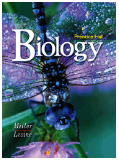 |
||
|
Unit
8 |
Can a better understanding of insects help protect farms from insect pests and protect humans from insect-borne diseases? U.S.
Centers for Disease Control: West Nile Virus Questions and answers http://www.cdc.gov/ncidod/dvbid/westnile/qa/overview.htm Also
see the CDC's West Nile Virus Homepage at http://www.cdc.gov/ncidod/dvbid/westnile/index.htm#prevention And
the more general references available at their Insects and Diseases
page at http://www.cdc.gov/ncidod/diseases/insects/ Bug-borne Disease Research: International (National Institute of Allergy and Infectious Diseases) http://www.niaid.nih.gov/newsroom/focuson/bugborne01/intl.htm
Sex-pheromone links to insect evolution suggest problems for pest control through mating disruption http://www.news.cornell.edu/releases/Sept02/SexPheromoneRoelofs.html Cornell
University entomologists have unlocked an evolutionary secret to how
insects evolve into new species. The discovery has major implications
for the control of insect populations through disruption of mating. What
will paleontology and molecular genetics tell us about how major groups
of invertebrates are related to one another - and to us? The
Evolutionary History of the Insects http://www.palaeos.com/Invertebrates/Arthropods/Insecta/insect_evolution.htm Insect Evolution page on the Virtual Fossil Museumhttp://www.fossilmuseum.net/Evolution/evolution%20segues/insect_evolution.htm
|
|
||||
| millerandlevine.com |
|

